Key Approaches to Operation Management and the Role of Leaders and Managers
VerifiedAdded on 2023/01/06
|15
|3951
|87
AI Summary
This report discusses the key approaches to operation management and the role that leaders and managers play in achieving business objectives. It also emphasizes the importance and value of operations management in Sainsbury Company.
Contribute Materials
Your contribution can guide someone’s learning journey. Share your
documents today.
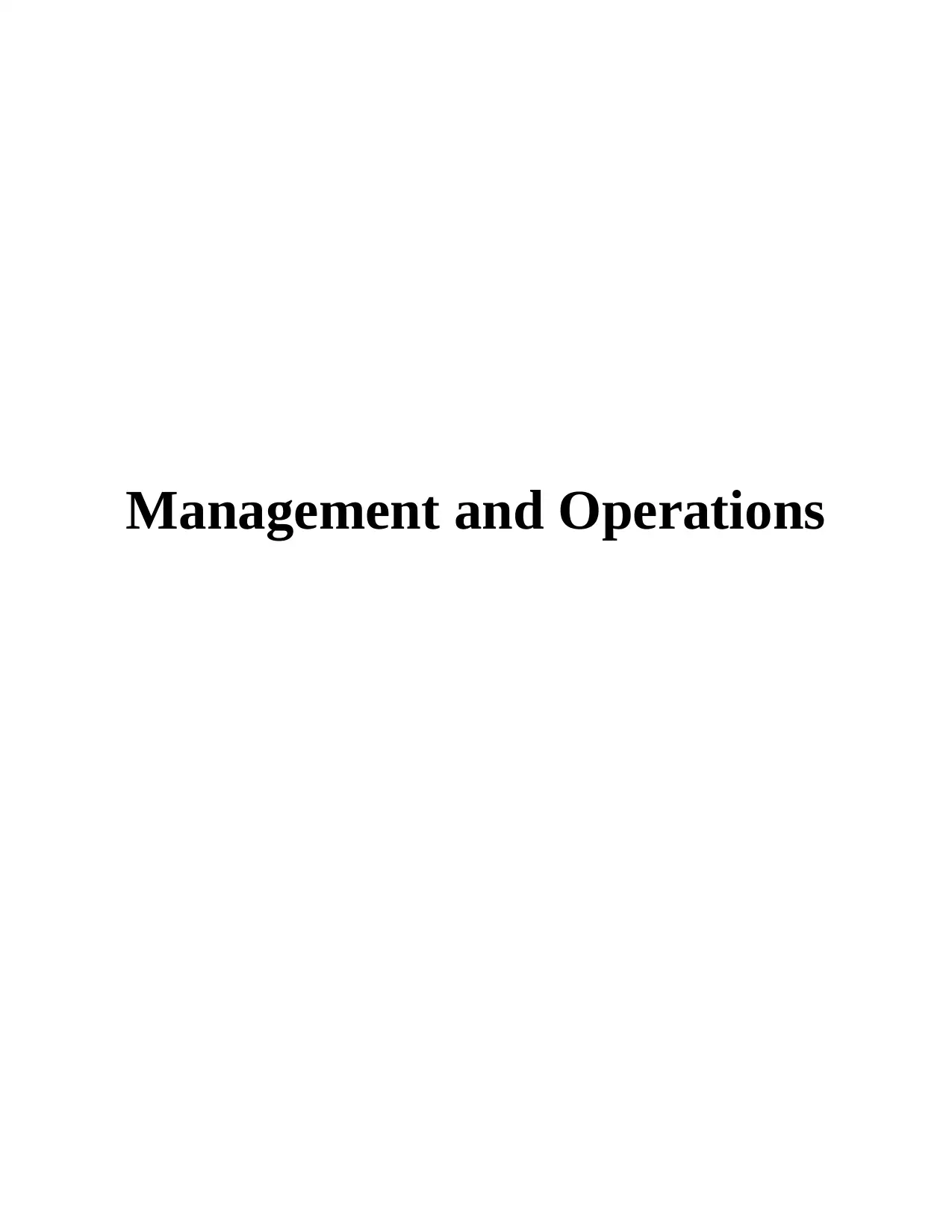
Management and Operations
Secure Best Marks with AI Grader
Need help grading? Try our AI Grader for instant feedback on your assignments.
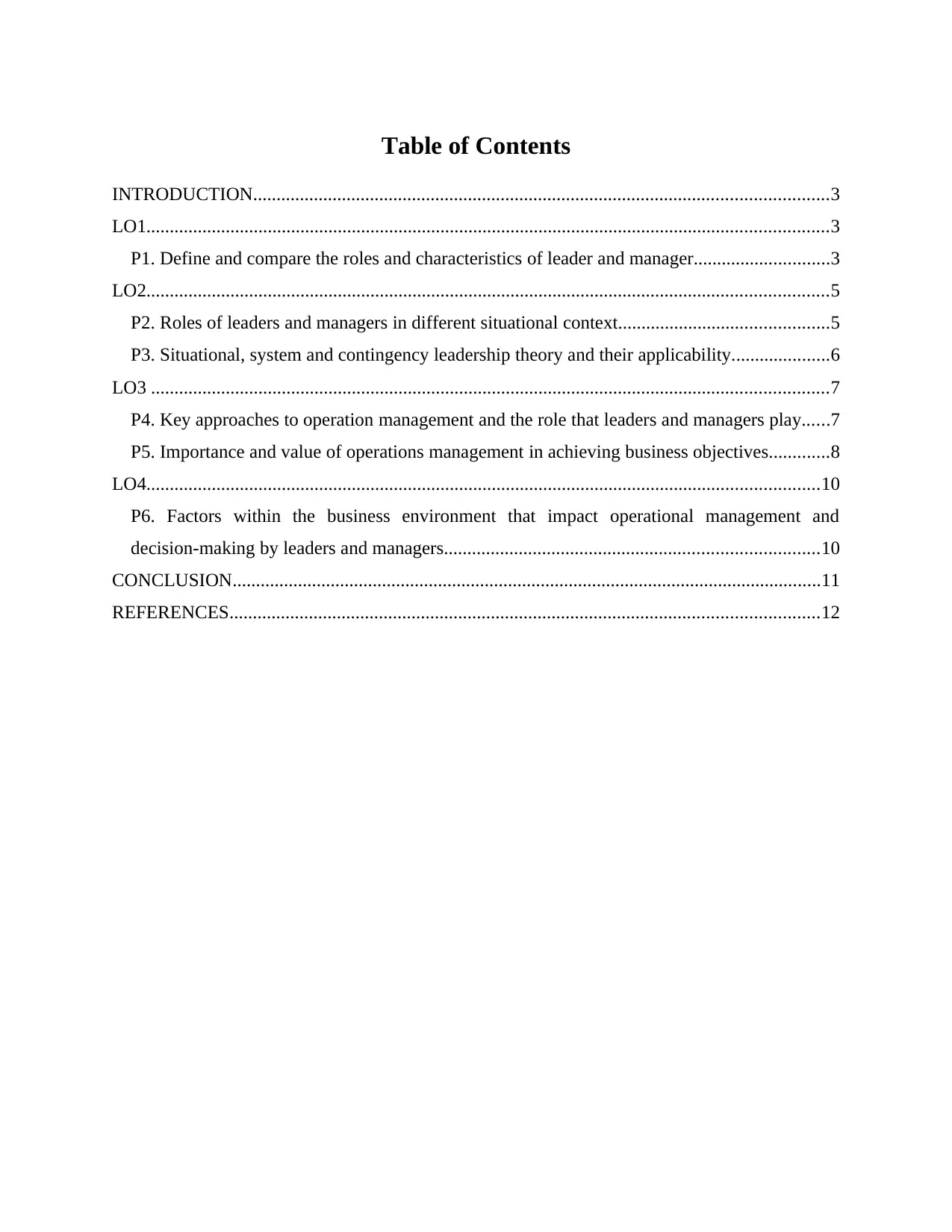
Table of Contents
INTRODUCTION...........................................................................................................................3
LO1..................................................................................................................................................3
P1. Define and compare the roles and characteristics of leader and manager.............................3
LO2..................................................................................................................................................5
P2. Roles of leaders and managers in different situational context.............................................5
P3. Situational, system and contingency leadership theory and their applicability.....................6
LO3 .................................................................................................................................................7
P4. Key approaches to operation management and the role that leaders and managers play......7
P5. Importance and value of operations management in achieving business objectives.............8
LO4................................................................................................................................................10
P6. Factors within the business environment that impact operational management and
decision-making by leaders and managers................................................................................10
CONCLUSION..............................................................................................................................11
REFERENCES..............................................................................................................................12
INTRODUCTION...........................................................................................................................3
LO1..................................................................................................................................................3
P1. Define and compare the roles and characteristics of leader and manager.............................3
LO2..................................................................................................................................................5
P2. Roles of leaders and managers in different situational context.............................................5
P3. Situational, system and contingency leadership theory and their applicability.....................6
LO3 .................................................................................................................................................7
P4. Key approaches to operation management and the role that leaders and managers play......7
P5. Importance and value of operations management in achieving business objectives.............8
LO4................................................................................................................................................10
P6. Factors within the business environment that impact operational management and
decision-making by leaders and managers................................................................................10
CONCLUSION..............................................................................................................................11
REFERENCES..............................................................................................................................12
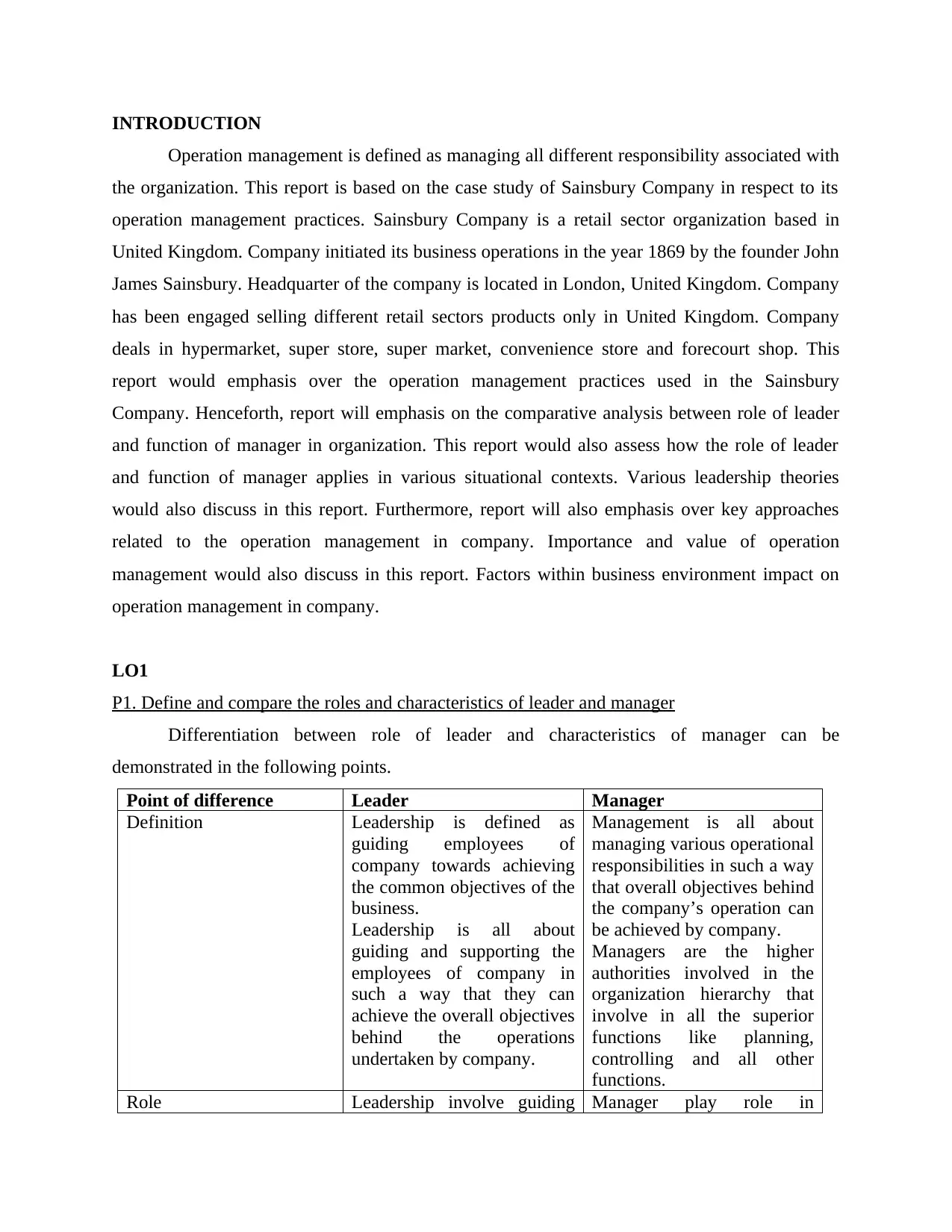
INTRODUCTION
Operation management is defined as managing all different responsibility associated with
the organization. This report is based on the case study of Sainsbury Company in respect to its
operation management practices. Sainsbury Company is a retail sector organization based in
United Kingdom. Company initiated its business operations in the year 1869 by the founder John
James Sainsbury. Headquarter of the company is located in London, United Kingdom. Company
has been engaged selling different retail sectors products only in United Kingdom. Company
deals in hypermarket, super store, super market, convenience store and forecourt shop. This
report would emphasis over the operation management practices used in the Sainsbury
Company. Henceforth, report will emphasis on the comparative analysis between role of leader
and function of manager in organization. This report would also assess how the role of leader
and function of manager applies in various situational contexts. Various leadership theories
would also discuss in this report. Furthermore, report will also emphasis over key approaches
related to the operation management in company. Importance and value of operation
management would also discuss in this report. Factors within business environment impact on
operation management in company.
LO1
P1. Define and compare the roles and characteristics of leader and manager
Differentiation between role of leader and characteristics of manager can be
demonstrated in the following points.
Point of difference Leader Manager
Definition Leadership is defined as
guiding employees of
company towards achieving
the common objectives of the
business.
Leadership is all about
guiding and supporting the
employees of company in
such a way that they can
achieve the overall objectives
behind the operations
undertaken by company.
Management is all about
managing various operational
responsibilities in such a way
that overall objectives behind
the company’s operation can
be achieved by company.
Managers are the higher
authorities involved in the
organization hierarchy that
involve in all the superior
functions like planning,
controlling and all other
functions.
Role Leadership involve guiding Manager play role in
Operation management is defined as managing all different responsibility associated with
the organization. This report is based on the case study of Sainsbury Company in respect to its
operation management practices. Sainsbury Company is a retail sector organization based in
United Kingdom. Company initiated its business operations in the year 1869 by the founder John
James Sainsbury. Headquarter of the company is located in London, United Kingdom. Company
has been engaged selling different retail sectors products only in United Kingdom. Company
deals in hypermarket, super store, super market, convenience store and forecourt shop. This
report would emphasis over the operation management practices used in the Sainsbury
Company. Henceforth, report will emphasis on the comparative analysis between role of leader
and function of manager in organization. This report would also assess how the role of leader
and function of manager applies in various situational contexts. Various leadership theories
would also discuss in this report. Furthermore, report will also emphasis over key approaches
related to the operation management in company. Importance and value of operation
management would also discuss in this report. Factors within business environment impact on
operation management in company.
LO1
P1. Define and compare the roles and characteristics of leader and manager
Differentiation between role of leader and characteristics of manager can be
demonstrated in the following points.
Point of difference Leader Manager
Definition Leadership is defined as
guiding employees of
company towards achieving
the common objectives of the
business.
Leadership is all about
guiding and supporting the
employees of company in
such a way that they can
achieve the overall objectives
behind the operations
undertaken by company.
Management is all about
managing various operational
responsibilities in such a way
that overall objectives behind
the company’s operation can
be achieved by company.
Managers are the higher
authorities involved in the
organization hierarchy that
involve in all the superior
functions like planning,
controlling and all other
functions.
Role Leadership involve guiding Manager play role in
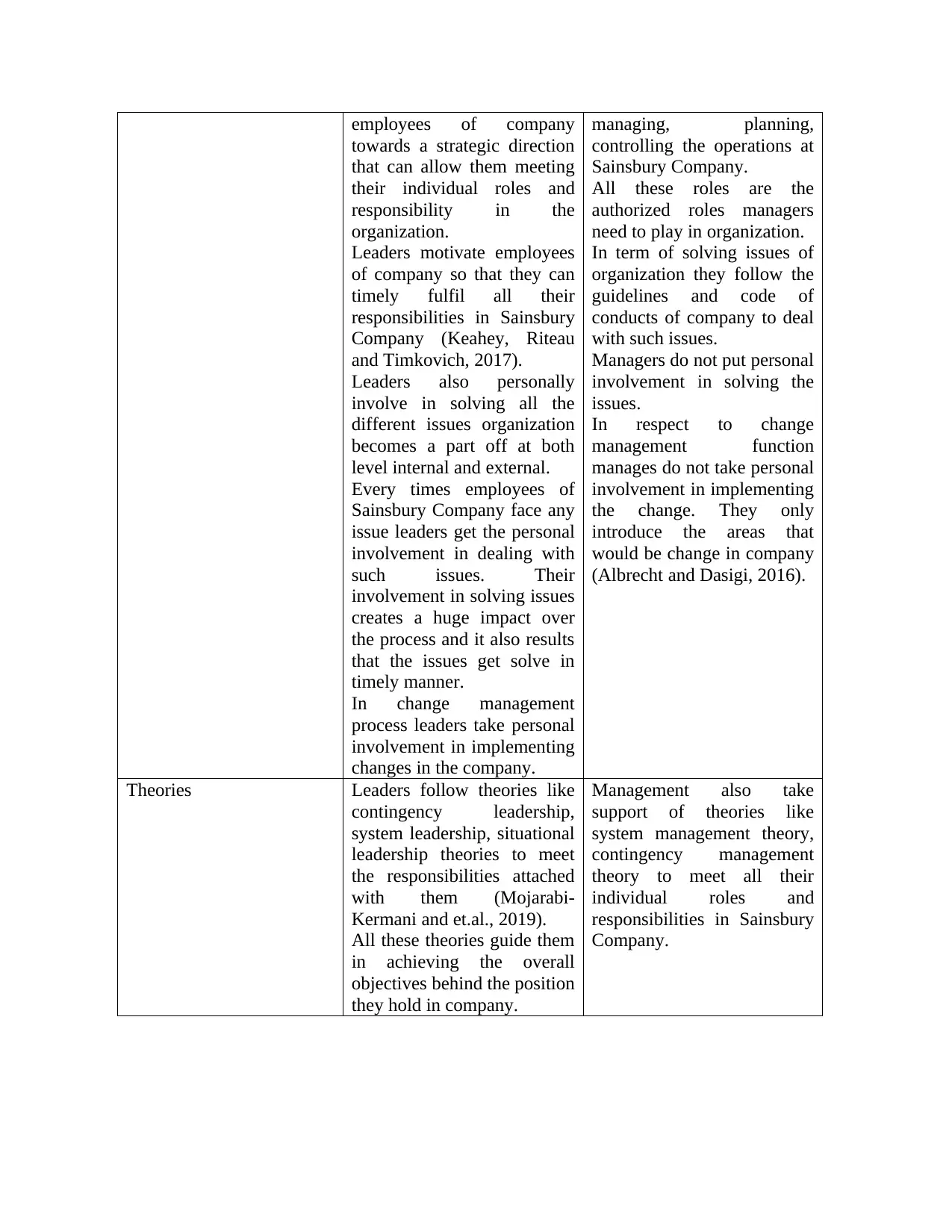
employees of company
towards a strategic direction
that can allow them meeting
their individual roles and
responsibility in the
organization.
Leaders motivate employees
of company so that they can
timely fulfil all their
responsibilities in Sainsbury
Company (Keahey, Riteau
and Timkovich, 2017).
Leaders also personally
involve in solving all the
different issues organization
becomes a part off at both
level internal and external.
Every times employees of
Sainsbury Company face any
issue leaders get the personal
involvement in dealing with
such issues. Their
involvement in solving issues
creates a huge impact over
the process and it also results
that the issues get solve in
timely manner.
In change management
process leaders take personal
involvement in implementing
changes in the company.
managing, planning,
controlling the operations at
Sainsbury Company.
All these roles are the
authorized roles managers
need to play in organization.
In term of solving issues of
organization they follow the
guidelines and code of
conducts of company to deal
with such issues.
Managers do not put personal
involvement in solving the
issues.
In respect to change
management function
manages do not take personal
involvement in implementing
the change. They only
introduce the areas that
would be change in company
(Albrecht and Dasigi, 2016).
Theories Leaders follow theories like
contingency leadership,
system leadership, situational
leadership theories to meet
the responsibilities attached
with them (Mojarabi-
Kermani and et.al., 2019).
All these theories guide them
in achieving the overall
objectives behind the position
they hold in company.
Management also take
support of theories like
system management theory,
contingency management
theory to meet all their
individual roles and
responsibilities in Sainsbury
Company.
towards a strategic direction
that can allow them meeting
their individual roles and
responsibility in the
organization.
Leaders motivate employees
of company so that they can
timely fulfil all their
responsibilities in Sainsbury
Company (Keahey, Riteau
and Timkovich, 2017).
Leaders also personally
involve in solving all the
different issues organization
becomes a part off at both
level internal and external.
Every times employees of
Sainsbury Company face any
issue leaders get the personal
involvement in dealing with
such issues. Their
involvement in solving issues
creates a huge impact over
the process and it also results
that the issues get solve in
timely manner.
In change management
process leaders take personal
involvement in implementing
changes in the company.
managing, planning,
controlling the operations at
Sainsbury Company.
All these roles are the
authorized roles managers
need to play in organization.
In term of solving issues of
organization they follow the
guidelines and code of
conducts of company to deal
with such issues.
Managers do not put personal
involvement in solving the
issues.
In respect to change
management function
manages do not take personal
involvement in implementing
the change. They only
introduce the areas that
would be change in company
(Albrecht and Dasigi, 2016).
Theories Leaders follow theories like
contingency leadership,
system leadership, situational
leadership theories to meet
the responsibilities attached
with them (Mojarabi-
Kermani and et.al., 2019).
All these theories guide them
in achieving the overall
objectives behind the position
they hold in company.
Management also take
support of theories like
system management theory,
contingency management
theory to meet all their
individual roles and
responsibilities in Sainsbury
Company.
Secure Best Marks with AI Grader
Need help grading? Try our AI Grader for instant feedback on your assignments.

LO2
P2. Roles of leaders and managers in different situational context
Role of leader and function of manager changes in different situational context.
Following are the points describe about the differentiation between the role of leader and
manager in various situation company get indulge with as a part of operation management.
Dealing issues
Issues are always a part of operation management in organization. Every time the Sainsbury
Company gets involved in any issue leaders take personal involvement in order to solve that
issue for the company. This is an individual characteristic of leader that they need to get involve
in solving the issue at personal level (Kindaichi and Nishina, 2018). Along with the standard
process of the organization based on the code of conducts of company leaders take personal
interest to deal with the issues in favour of both the stakeholders involve in the issues. As leaders
always like to interact with all different stakeholders part of the company which also help them
in making the mutual interest of both the party involve in issues with some specific solution of
such problem.
Management in company always try to follow the standard process of company of
dealing with any issue based on the code of conducts of company. They follow the set guidelines
of the company for dealing with the issue. As they also carry the huge responsibility of managing
every single functional activity part of operation management they do not carry much time to
overlook every single in the depth analytical manner.
Change management
Leaders also involve in change management. On the basis of the needs and requirements
of the Sainsbury Company they introduce changes in company. While introducing the change
they also take the risk which can allow the company to take strategic advantages in future of
such change (Zhen and et.al., 2017). Leaders take personal involvement in every single stage of
change management operation. They involve in planning along with implementation process of
change management in Sainsbury Company.
Managers get involve in introducing the changes as per change management function.
They introduce changes based on the current and future needs and requirements of company.
They do not take personal involvement in implementing the change in the company.
P2. Roles of leaders and managers in different situational context
Role of leader and function of manager changes in different situational context.
Following are the points describe about the differentiation between the role of leader and
manager in various situation company get indulge with as a part of operation management.
Dealing issues
Issues are always a part of operation management in organization. Every time the Sainsbury
Company gets involved in any issue leaders take personal involvement in order to solve that
issue for the company. This is an individual characteristic of leader that they need to get involve
in solving the issue at personal level (Kindaichi and Nishina, 2018). Along with the standard
process of the organization based on the code of conducts of company leaders take personal
interest to deal with the issues in favour of both the stakeholders involve in the issues. As leaders
always like to interact with all different stakeholders part of the company which also help them
in making the mutual interest of both the party involve in issues with some specific solution of
such problem.
Management in company always try to follow the standard process of company of
dealing with any issue based on the code of conducts of company. They follow the set guidelines
of the company for dealing with the issue. As they also carry the huge responsibility of managing
every single functional activity part of operation management they do not carry much time to
overlook every single in the depth analytical manner.
Change management
Leaders also involve in change management. On the basis of the needs and requirements
of the Sainsbury Company they introduce changes in company. While introducing the change
they also take the risk which can allow the company to take strategic advantages in future of
such change (Zhen and et.al., 2017). Leaders take personal involvement in every single stage of
change management operation. They involve in planning along with implementation process of
change management in Sainsbury Company.
Managers get involve in introducing the changes as per change management function.
They introduce changes based on the current and future needs and requirements of company.
They do not take personal involvement in implementing the change in the company.
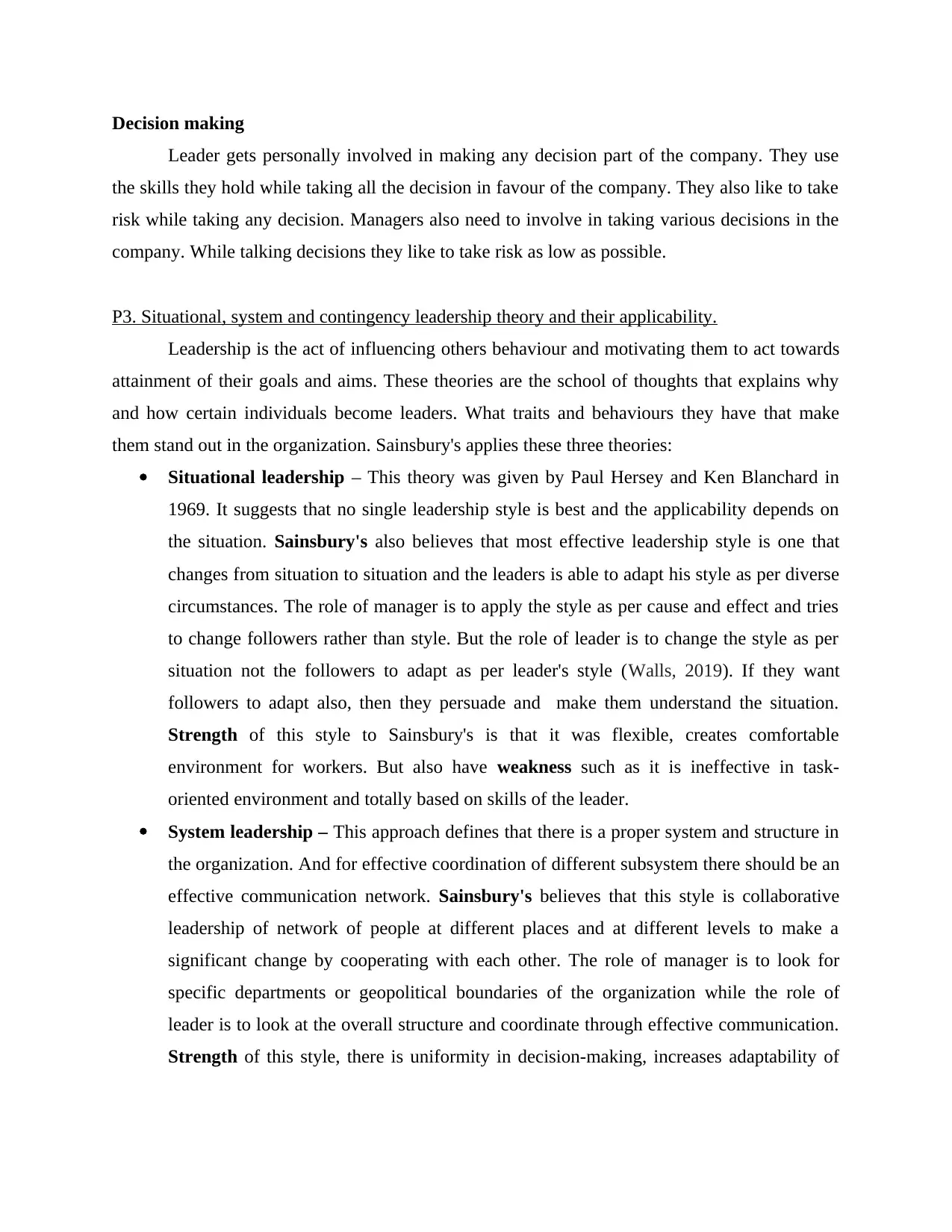
Decision making
Leader gets personally involved in making any decision part of the company. They use
the skills they hold while taking all the decision in favour of the company. They also like to take
risk while taking any decision. Managers also need to involve in taking various decisions in the
company. While talking decisions they like to take risk as low as possible.
P3. Situational, system and contingency leadership theory and their applicability.
Leadership is the act of influencing others behaviour and motivating them to act towards
attainment of their goals and aims. These theories are the school of thoughts that explains why
and how certain individuals become leaders. What traits and behaviours they have that make
them stand out in the organization. Sainsbury's applies these three theories:
Situational leadership – This theory was given by Paul Hersey and Ken Blanchard in
1969. It suggests that no single leadership style is best and the applicability depends on
the situation. Sainsbury's also believes that most effective leadership style is one that
changes from situation to situation and the leaders is able to adapt his style as per diverse
circumstances. The role of manager is to apply the style as per cause and effect and tries
to change followers rather than style. But the role of leader is to change the style as per
situation not the followers to adapt as per leader's style (Walls, 2019). If they want
followers to adapt also, then they persuade and make them understand the situation.
Strength of this style to Sainsbury's is that it was flexible, creates comfortable
environment for workers. But also have weakness such as it is ineffective in task-
oriented environment and totally based on skills of the leader.
System leadership – This approach defines that there is a proper system and structure in
the organization. And for effective coordination of different subsystem there should be an
effective communication network. Sainsbury's believes that this style is collaborative
leadership of network of people at different places and at different levels to make a
significant change by cooperating with each other. The role of manager is to look for
specific departments or geopolitical boundaries of the organization while the role of
leader is to look at the overall structure and coordinate through effective communication.
Strength of this style, there is uniformity in decision-making, increases adaptability of
Leader gets personally involved in making any decision part of the company. They use
the skills they hold while taking all the decision in favour of the company. They also like to take
risk while taking any decision. Managers also need to involve in taking various decisions in the
company. While talking decisions they like to take risk as low as possible.
P3. Situational, system and contingency leadership theory and their applicability.
Leadership is the act of influencing others behaviour and motivating them to act towards
attainment of their goals and aims. These theories are the school of thoughts that explains why
and how certain individuals become leaders. What traits and behaviours they have that make
them stand out in the organization. Sainsbury's applies these three theories:
Situational leadership – This theory was given by Paul Hersey and Ken Blanchard in
1969. It suggests that no single leadership style is best and the applicability depends on
the situation. Sainsbury's also believes that most effective leadership style is one that
changes from situation to situation and the leaders is able to adapt his style as per diverse
circumstances. The role of manager is to apply the style as per cause and effect and tries
to change followers rather than style. But the role of leader is to change the style as per
situation not the followers to adapt as per leader's style (Walls, 2019). If they want
followers to adapt also, then they persuade and make them understand the situation.
Strength of this style to Sainsbury's is that it was flexible, creates comfortable
environment for workers. But also have weakness such as it is ineffective in task-
oriented environment and totally based on skills of the leader.
System leadership – This approach defines that there is a proper system and structure in
the organization. And for effective coordination of different subsystem there should be an
effective communication network. Sainsbury's believes that this style is collaborative
leadership of network of people at different places and at different levels to make a
significant change by cooperating with each other. The role of manager is to look for
specific departments or geopolitical boundaries of the organization while the role of
leader is to look at the overall structure and coordinate through effective communication.
Strength of this style, there is uniformity in decision-making, increases adaptability of
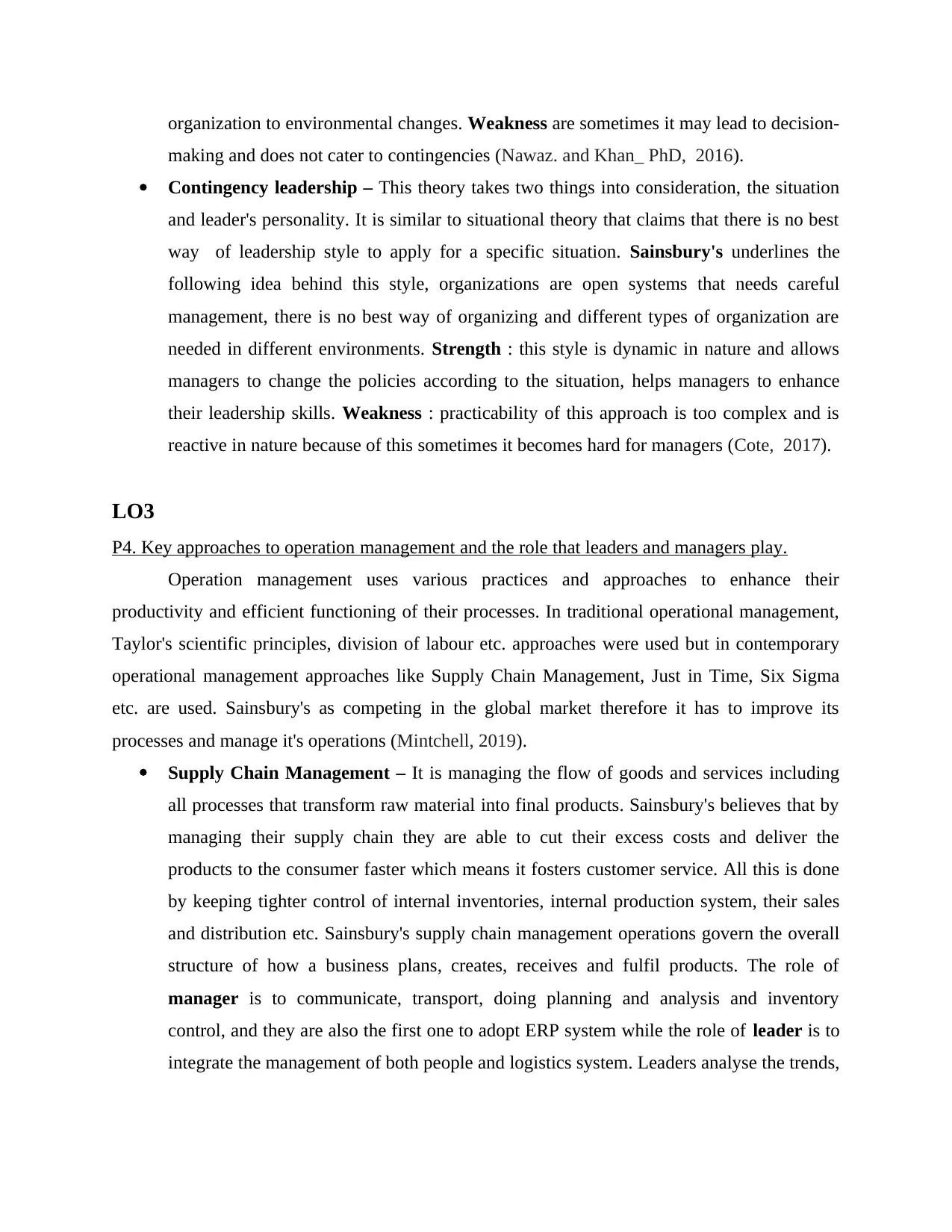
organization to environmental changes. Weakness are sometimes it may lead to decision-
making and does not cater to contingencies (Nawaz. and Khan_ PhD, 2016).
Contingency leadership – This theory takes two things into consideration, the situation
and leader's personality. It is similar to situational theory that claims that there is no best
way of leadership style to apply for a specific situation. Sainsbury's underlines the
following idea behind this style, organizations are open systems that needs careful
management, there is no best way of organizing and different types of organization are
needed in different environments. Strength : this style is dynamic in nature and allows
managers to change the policies according to the situation, helps managers to enhance
their leadership skills. Weakness : practicability of this approach is too complex and is
reactive in nature because of this sometimes it becomes hard for managers (Cote, 2017).
LO3
P4. Key approaches to operation management and the role that leaders and managers play.
Operation management uses various practices and approaches to enhance their
productivity and efficient functioning of their processes. In traditional operational management,
Taylor's scientific principles, division of labour etc. approaches were used but in contemporary
operational management approaches like Supply Chain Management, Just in Time, Six Sigma
etc. are used. Sainsbury's as competing in the global market therefore it has to improve its
processes and manage it's operations (Mintchell, 2019).
Supply Chain Management – It is managing the flow of goods and services including
all processes that transform raw material into final products. Sainsbury's believes that by
managing their supply chain they are able to cut their excess costs and deliver the
products to the consumer faster which means it fosters customer service. All this is done
by keeping tighter control of internal inventories, internal production system, their sales
and distribution etc. Sainsbury's supply chain management operations govern the overall
structure of how a business plans, creates, receives and fulfil products. The role of
manager is to communicate, transport, doing planning and analysis and inventory
control, and they are also the first one to adopt ERP system while the role of leader is to
integrate the management of both people and logistics system. Leaders analyse the trends,
making and does not cater to contingencies (Nawaz. and Khan_ PhD, 2016).
Contingency leadership – This theory takes two things into consideration, the situation
and leader's personality. It is similar to situational theory that claims that there is no best
way of leadership style to apply for a specific situation. Sainsbury's underlines the
following idea behind this style, organizations are open systems that needs careful
management, there is no best way of organizing and different types of organization are
needed in different environments. Strength : this style is dynamic in nature and allows
managers to change the policies according to the situation, helps managers to enhance
their leadership skills. Weakness : practicability of this approach is too complex and is
reactive in nature because of this sometimes it becomes hard for managers (Cote, 2017).
LO3
P4. Key approaches to operation management and the role that leaders and managers play.
Operation management uses various practices and approaches to enhance their
productivity and efficient functioning of their processes. In traditional operational management,
Taylor's scientific principles, division of labour etc. approaches were used but in contemporary
operational management approaches like Supply Chain Management, Just in Time, Six Sigma
etc. are used. Sainsbury's as competing in the global market therefore it has to improve its
processes and manage it's operations (Mintchell, 2019).
Supply Chain Management – It is managing the flow of goods and services including
all processes that transform raw material into final products. Sainsbury's believes that by
managing their supply chain they are able to cut their excess costs and deliver the
products to the consumer faster which means it fosters customer service. All this is done
by keeping tighter control of internal inventories, internal production system, their sales
and distribution etc. Sainsbury's supply chain management operations govern the overall
structure of how a business plans, creates, receives and fulfil products. The role of
manager is to communicate, transport, doing planning and analysis and inventory
control, and they are also the first one to adopt ERP system while the role of leader is to
integrate the management of both people and logistics system. Leaders analyse the trends,
Paraphrase This Document
Need a fresh take? Get an instant paraphrase of this document with our AI Paraphraser
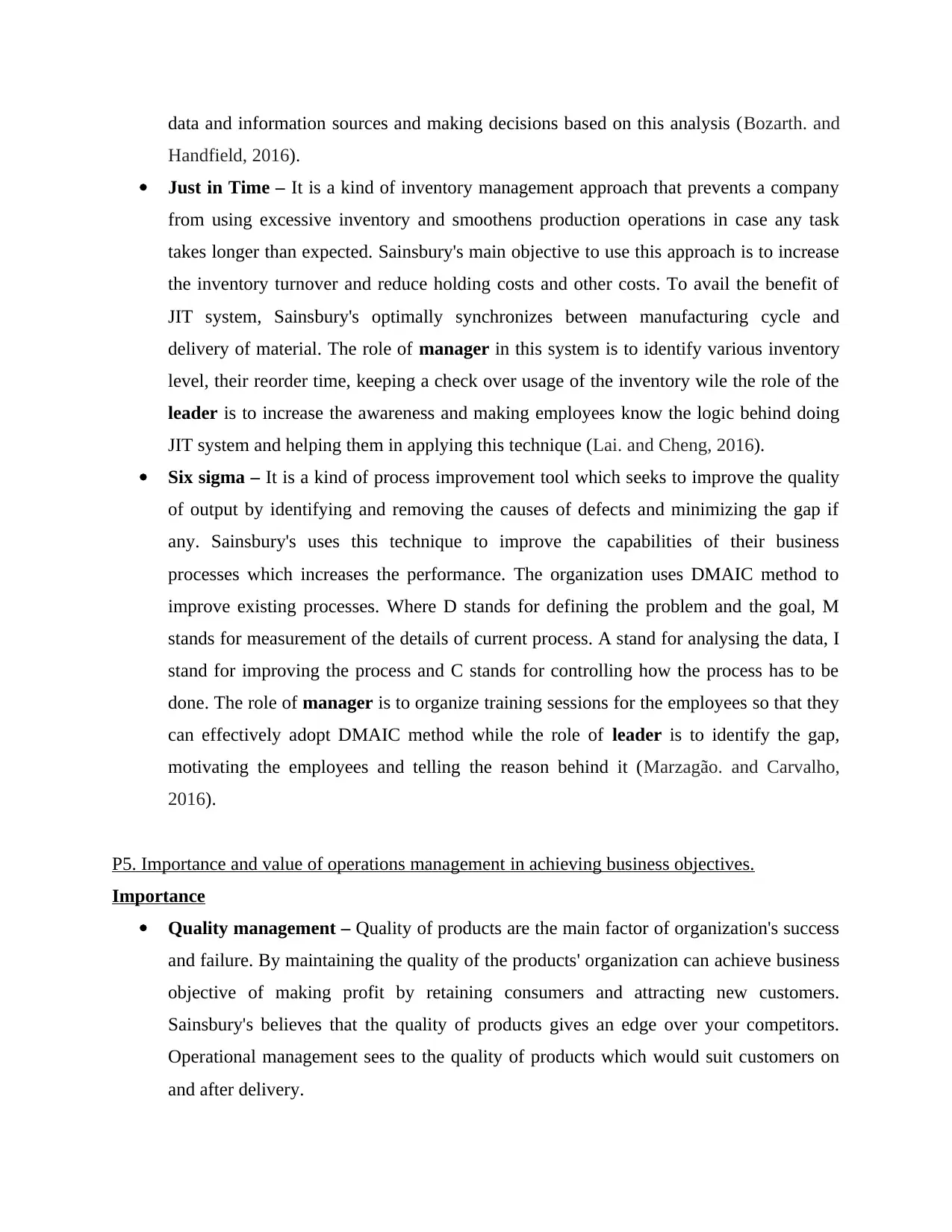
data and information sources and making decisions based on this analysis (Bozarth. and
Handfield, 2016).
Just in Time – It is a kind of inventory management approach that prevents a company
from using excessive inventory and smoothens production operations in case any task
takes longer than expected. Sainsbury's main objective to use this approach is to increase
the inventory turnover and reduce holding costs and other costs. To avail the benefit of
JIT system, Sainsbury's optimally synchronizes between manufacturing cycle and
delivery of material. The role of manager in this system is to identify various inventory
level, their reorder time, keeping a check over usage of the inventory wile the role of the
leader is to increase the awareness and making employees know the logic behind doing
JIT system and helping them in applying this technique (Lai. and Cheng, 2016).
Six sigma – It is a kind of process improvement tool which seeks to improve the quality
of output by identifying and removing the causes of defects and minimizing the gap if
any. Sainsbury's uses this technique to improve the capabilities of their business
processes which increases the performance. The organization uses DMAIC method to
improve existing processes. Where D stands for defining the problem and the goal, M
stands for measurement of the details of current process. A stand for analysing the data, I
stand for improving the process and C stands for controlling how the process has to be
done. The role of manager is to organize training sessions for the employees so that they
can effectively adopt DMAIC method while the role of leader is to identify the gap,
motivating the employees and telling the reason behind it (Marzagão. and Carvalho,
2016).
P5. Importance and value of operations management in achieving business objectives.
Importance
Quality management – Quality of products are the main factor of organization's success
and failure. By maintaining the quality of the products' organization can achieve business
objective of making profit by retaining consumers and attracting new customers.
Sainsbury's believes that the quality of products gives an edge over your competitors.
Operational management sees to the quality of products which would suit customers on
and after delivery.
Handfield, 2016).
Just in Time – It is a kind of inventory management approach that prevents a company
from using excessive inventory and smoothens production operations in case any task
takes longer than expected. Sainsbury's main objective to use this approach is to increase
the inventory turnover and reduce holding costs and other costs. To avail the benefit of
JIT system, Sainsbury's optimally synchronizes between manufacturing cycle and
delivery of material. The role of manager in this system is to identify various inventory
level, their reorder time, keeping a check over usage of the inventory wile the role of the
leader is to increase the awareness and making employees know the logic behind doing
JIT system and helping them in applying this technique (Lai. and Cheng, 2016).
Six sigma – It is a kind of process improvement tool which seeks to improve the quality
of output by identifying and removing the causes of defects and minimizing the gap if
any. Sainsbury's uses this technique to improve the capabilities of their business
processes which increases the performance. The organization uses DMAIC method to
improve existing processes. Where D stands for defining the problem and the goal, M
stands for measurement of the details of current process. A stand for analysing the data, I
stand for improving the process and C stands for controlling how the process has to be
done. The role of manager is to organize training sessions for the employees so that they
can effectively adopt DMAIC method while the role of leader is to identify the gap,
motivating the employees and telling the reason behind it (Marzagão. and Carvalho,
2016).
P5. Importance and value of operations management in achieving business objectives.
Importance
Quality management – Quality of products are the main factor of organization's success
and failure. By maintaining the quality of the products' organization can achieve business
objective of making profit by retaining consumers and attracting new customers.
Sainsbury's believes that the quality of products gives an edge over your competitors.
Operational management sees to the quality of products which would suit customers on
and after delivery.
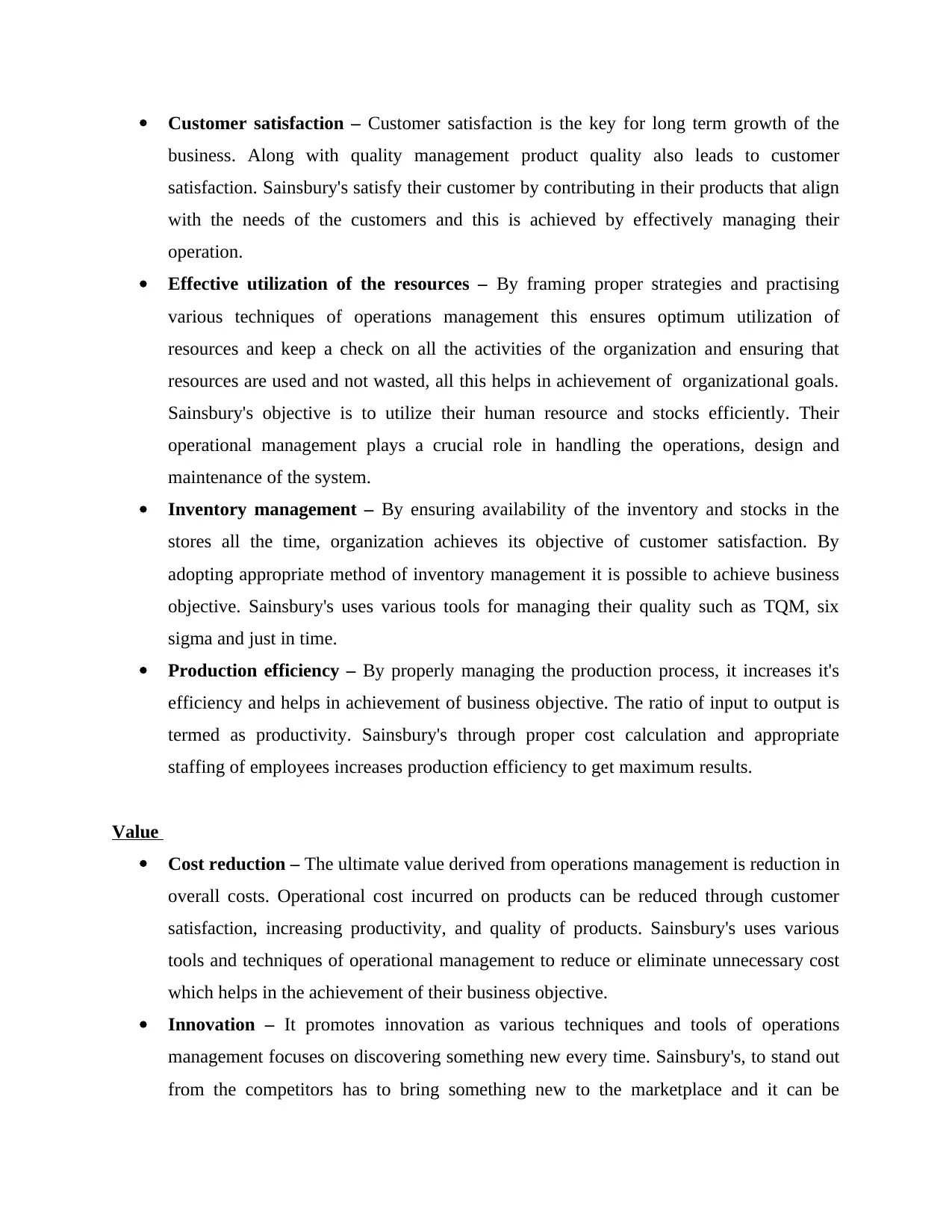
Customer satisfaction – Customer satisfaction is the key for long term growth of the
business. Along with quality management product quality also leads to customer
satisfaction. Sainsbury's satisfy their customer by contributing in their products that align
with the needs of the customers and this is achieved by effectively managing their
operation.
Effective utilization of the resources – By framing proper strategies and practising
various techniques of operations management this ensures optimum utilization of
resources and keep a check on all the activities of the organization and ensuring that
resources are used and not wasted, all this helps in achievement of organizational goals.
Sainsbury's objective is to utilize their human resource and stocks efficiently. Their
operational management plays a crucial role in handling the operations, design and
maintenance of the system.
Inventory management – By ensuring availability of the inventory and stocks in the
stores all the time, organization achieves its objective of customer satisfaction. By
adopting appropriate method of inventory management it is possible to achieve business
objective. Sainsbury's uses various tools for managing their quality such as TQM, six
sigma and just in time.
Production efficiency – By properly managing the production process, it increases it's
efficiency and helps in achievement of business objective. The ratio of input to output is
termed as productivity. Sainsbury's through proper cost calculation and appropriate
staffing of employees increases production efficiency to get maximum results.
Value
Cost reduction – The ultimate value derived from operations management is reduction in
overall costs. Operational cost incurred on products can be reduced through customer
satisfaction, increasing productivity, and quality of products. Sainsbury's uses various
tools and techniques of operational management to reduce or eliminate unnecessary cost
which helps in the achievement of their business objective.
Innovation – It promotes innovation as various techniques and tools of operations
management focuses on discovering something new every time. Sainsbury's, to stand out
from the competitors has to bring something new to the marketplace and it can be
business. Along with quality management product quality also leads to customer
satisfaction. Sainsbury's satisfy their customer by contributing in their products that align
with the needs of the customers and this is achieved by effectively managing their
operation.
Effective utilization of the resources – By framing proper strategies and practising
various techniques of operations management this ensures optimum utilization of
resources and keep a check on all the activities of the organization and ensuring that
resources are used and not wasted, all this helps in achievement of organizational goals.
Sainsbury's objective is to utilize their human resource and stocks efficiently. Their
operational management plays a crucial role in handling the operations, design and
maintenance of the system.
Inventory management – By ensuring availability of the inventory and stocks in the
stores all the time, organization achieves its objective of customer satisfaction. By
adopting appropriate method of inventory management it is possible to achieve business
objective. Sainsbury's uses various tools for managing their quality such as TQM, six
sigma and just in time.
Production efficiency – By properly managing the production process, it increases it's
efficiency and helps in achievement of business objective. The ratio of input to output is
termed as productivity. Sainsbury's through proper cost calculation and appropriate
staffing of employees increases production efficiency to get maximum results.
Value
Cost reduction – The ultimate value derived from operations management is reduction in
overall costs. Operational cost incurred on products can be reduced through customer
satisfaction, increasing productivity, and quality of products. Sainsbury's uses various
tools and techniques of operational management to reduce or eliminate unnecessary cost
which helps in the achievement of their business objective.
Innovation – It promotes innovation as various techniques and tools of operations
management focuses on discovering something new every time. Sainsbury's, to stand out
from the competitors has to bring something new to the marketplace and it can be
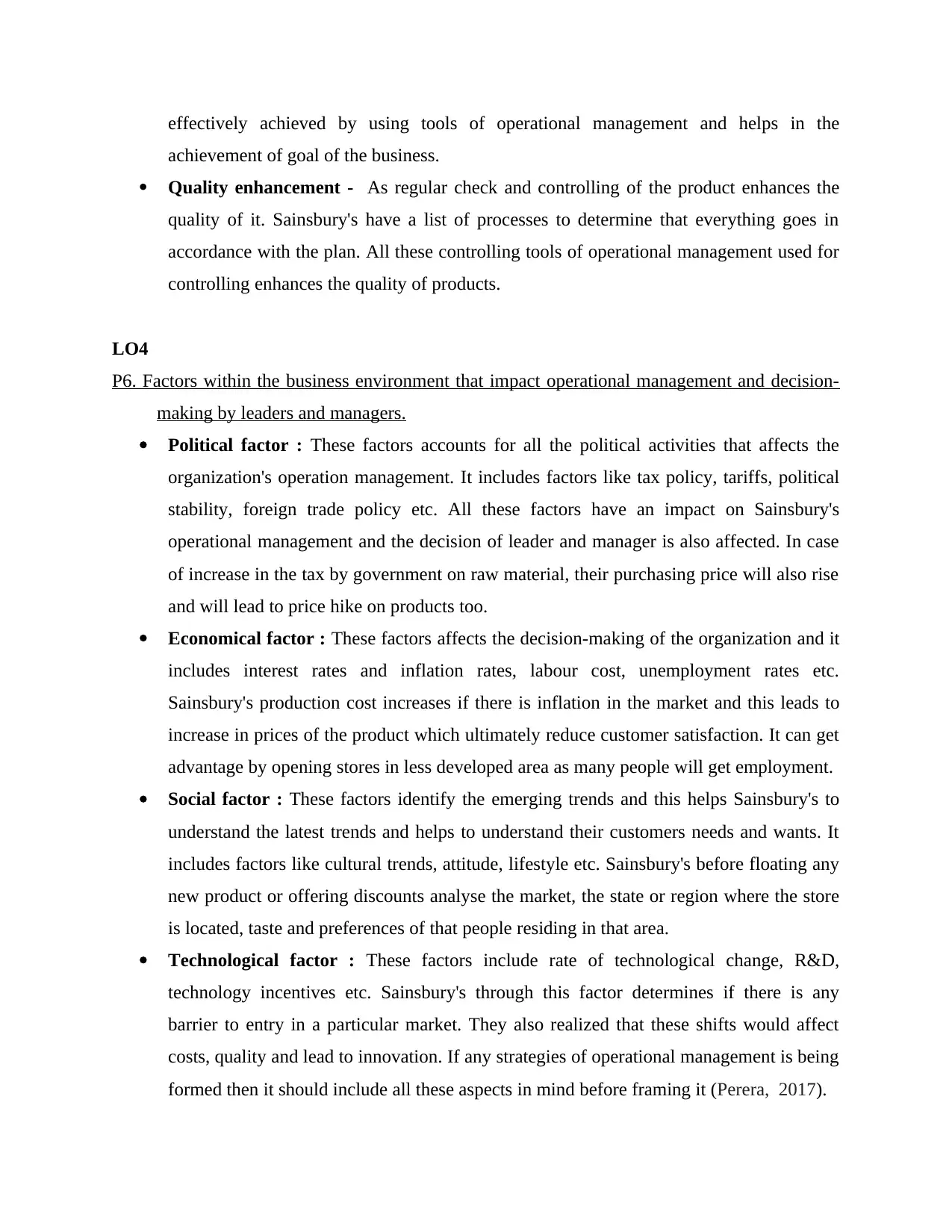
effectively achieved by using tools of operational management and helps in the
achievement of goal of the business.
Quality enhancement - As regular check and controlling of the product enhances the
quality of it. Sainsbury's have a list of processes to determine that everything goes in
accordance with the plan. All these controlling tools of operational management used for
controlling enhances the quality of products.
LO4
P6. Factors within the business environment that impact operational management and decision-
making by leaders and managers.
Political factor : These factors accounts for all the political activities that affects the
organization's operation management. It includes factors like tax policy, tariffs, political
stability, foreign trade policy etc. All these factors have an impact on Sainsbury's
operational management and the decision of leader and manager is also affected. In case
of increase in the tax by government on raw material, their purchasing price will also rise
and will lead to price hike on products too.
Economical factor : These factors affects the decision-making of the organization and it
includes interest rates and inflation rates, labour cost, unemployment rates etc.
Sainsbury's production cost increases if there is inflation in the market and this leads to
increase in prices of the product which ultimately reduce customer satisfaction. It can get
advantage by opening stores in less developed area as many people will get employment.
Social factor : These factors identify the emerging trends and this helps Sainsbury's to
understand the latest trends and helps to understand their customers needs and wants. It
includes factors like cultural trends, attitude, lifestyle etc. Sainsbury's before floating any
new product or offering discounts analyse the market, the state or region where the store
is located, taste and preferences of that people residing in that area.
Technological factor : These factors include rate of technological change, R&D,
technology incentives etc. Sainsbury's through this factor determines if there is any
barrier to entry in a particular market. They also realized that these shifts would affect
costs, quality and lead to innovation. If any strategies of operational management is being
formed then it should include all these aspects in mind before framing it (Perera, 2017).
achievement of goal of the business.
Quality enhancement - As regular check and controlling of the product enhances the
quality of it. Sainsbury's have a list of processes to determine that everything goes in
accordance with the plan. All these controlling tools of operational management used for
controlling enhances the quality of products.
LO4
P6. Factors within the business environment that impact operational management and decision-
making by leaders and managers.
Political factor : These factors accounts for all the political activities that affects the
organization's operation management. It includes factors like tax policy, tariffs, political
stability, foreign trade policy etc. All these factors have an impact on Sainsbury's
operational management and the decision of leader and manager is also affected. In case
of increase in the tax by government on raw material, their purchasing price will also rise
and will lead to price hike on products too.
Economical factor : These factors affects the decision-making of the organization and it
includes interest rates and inflation rates, labour cost, unemployment rates etc.
Sainsbury's production cost increases if there is inflation in the market and this leads to
increase in prices of the product which ultimately reduce customer satisfaction. It can get
advantage by opening stores in less developed area as many people will get employment.
Social factor : These factors identify the emerging trends and this helps Sainsbury's to
understand the latest trends and helps to understand their customers needs and wants. It
includes factors like cultural trends, attitude, lifestyle etc. Sainsbury's before floating any
new product or offering discounts analyse the market, the state or region where the store
is located, taste and preferences of that people residing in that area.
Technological factor : These factors include rate of technological change, R&D,
technology incentives etc. Sainsbury's through this factor determines if there is any
barrier to entry in a particular market. They also realized that these shifts would affect
costs, quality and lead to innovation. If any strategies of operational management is being
formed then it should include all these aspects in mind before framing it (Perera, 2017).
Secure Best Marks with AI Grader
Need help grading? Try our AI Grader for instant feedback on your assignments.
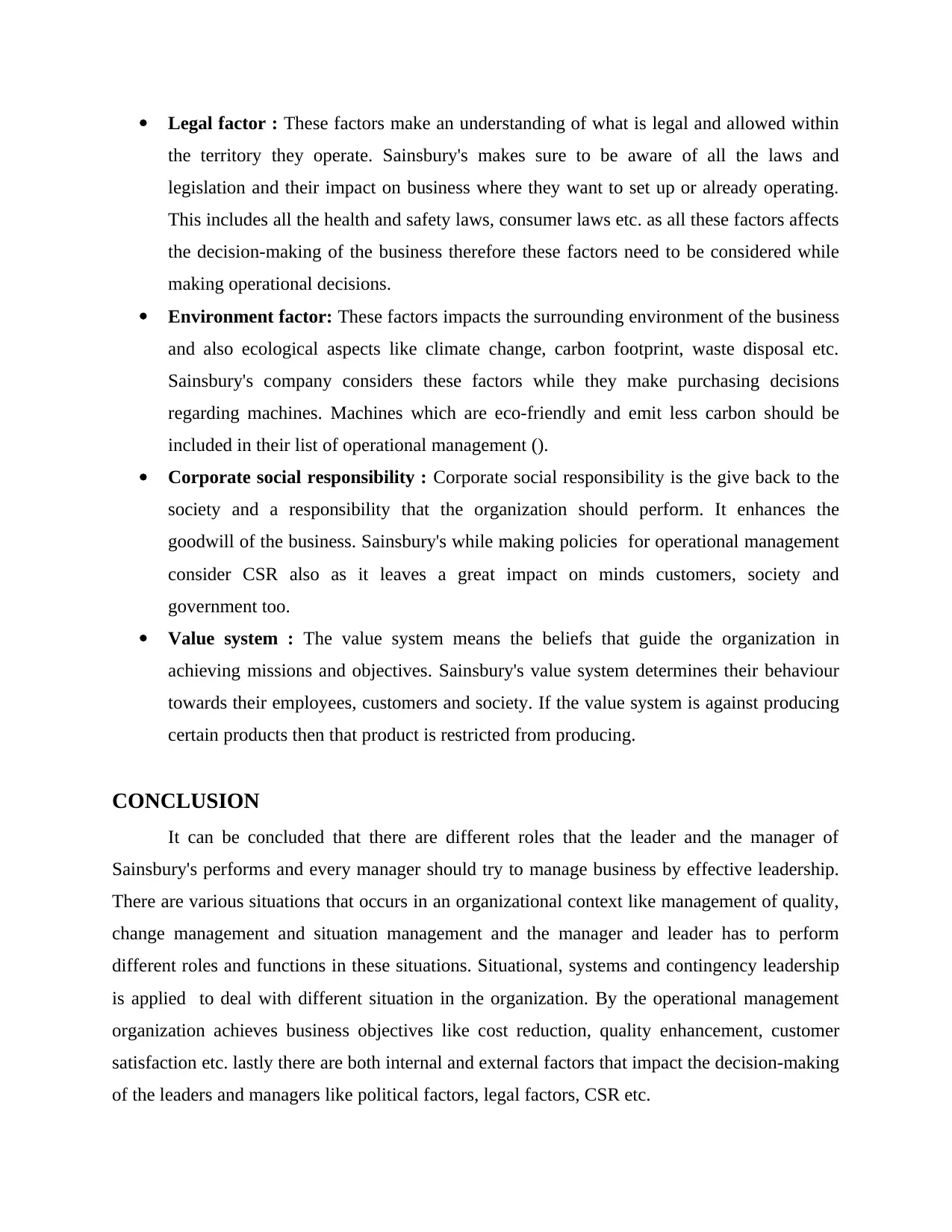
Legal factor : These factors make an understanding of what is legal and allowed within
the territory they operate. Sainsbury's makes sure to be aware of all the laws and
legislation and their impact on business where they want to set up or already operating.
This includes all the health and safety laws, consumer laws etc. as all these factors affects
the decision-making of the business therefore these factors need to be considered while
making operational decisions.
Environment factor: These factors impacts the surrounding environment of the business
and also ecological aspects like climate change, carbon footprint, waste disposal etc.
Sainsbury's company considers these factors while they make purchasing decisions
regarding machines. Machines which are eco-friendly and emit less carbon should be
included in their list of operational management ().
Corporate social responsibility : Corporate social responsibility is the give back to the
society and a responsibility that the organization should perform. It enhances the
goodwill of the business. Sainsbury's while making policies for operational management
consider CSR also as it leaves a great impact on minds customers, society and
government too.
Value system : The value system means the beliefs that guide the organization in
achieving missions and objectives. Sainsbury's value system determines their behaviour
towards their employees, customers and society. If the value system is against producing
certain products then that product is restricted from producing.
CONCLUSION
It can be concluded that there are different roles that the leader and the manager of
Sainsbury's performs and every manager should try to manage business by effective leadership.
There are various situations that occurs in an organizational context like management of quality,
change management and situation management and the manager and leader has to perform
different roles and functions in these situations. Situational, systems and contingency leadership
is applied to deal with different situation in the organization. By the operational management
organization achieves business objectives like cost reduction, quality enhancement, customer
satisfaction etc. lastly there are both internal and external factors that impact the decision-making
of the leaders and managers like political factors, legal factors, CSR etc.
the territory they operate. Sainsbury's makes sure to be aware of all the laws and
legislation and their impact on business where they want to set up or already operating.
This includes all the health and safety laws, consumer laws etc. as all these factors affects
the decision-making of the business therefore these factors need to be considered while
making operational decisions.
Environment factor: These factors impacts the surrounding environment of the business
and also ecological aspects like climate change, carbon footprint, waste disposal etc.
Sainsbury's company considers these factors while they make purchasing decisions
regarding machines. Machines which are eco-friendly and emit less carbon should be
included in their list of operational management ().
Corporate social responsibility : Corporate social responsibility is the give back to the
society and a responsibility that the organization should perform. It enhances the
goodwill of the business. Sainsbury's while making policies for operational management
consider CSR also as it leaves a great impact on minds customers, society and
government too.
Value system : The value system means the beliefs that guide the organization in
achieving missions and objectives. Sainsbury's value system determines their behaviour
towards their employees, customers and society. If the value system is against producing
certain products then that product is restricted from producing.
CONCLUSION
It can be concluded that there are different roles that the leader and the manager of
Sainsbury's performs and every manager should try to manage business by effective leadership.
There are various situations that occurs in an organizational context like management of quality,
change management and situation management and the manager and leader has to perform
different roles and functions in these situations. Situational, systems and contingency leadership
is applied to deal with different situation in the organization. By the operational management
organization achieves business objectives like cost reduction, quality enhancement, customer
satisfaction etc. lastly there are both internal and external factors that impact the decision-making
of the leaders and managers like political factors, legal factors, CSR etc.
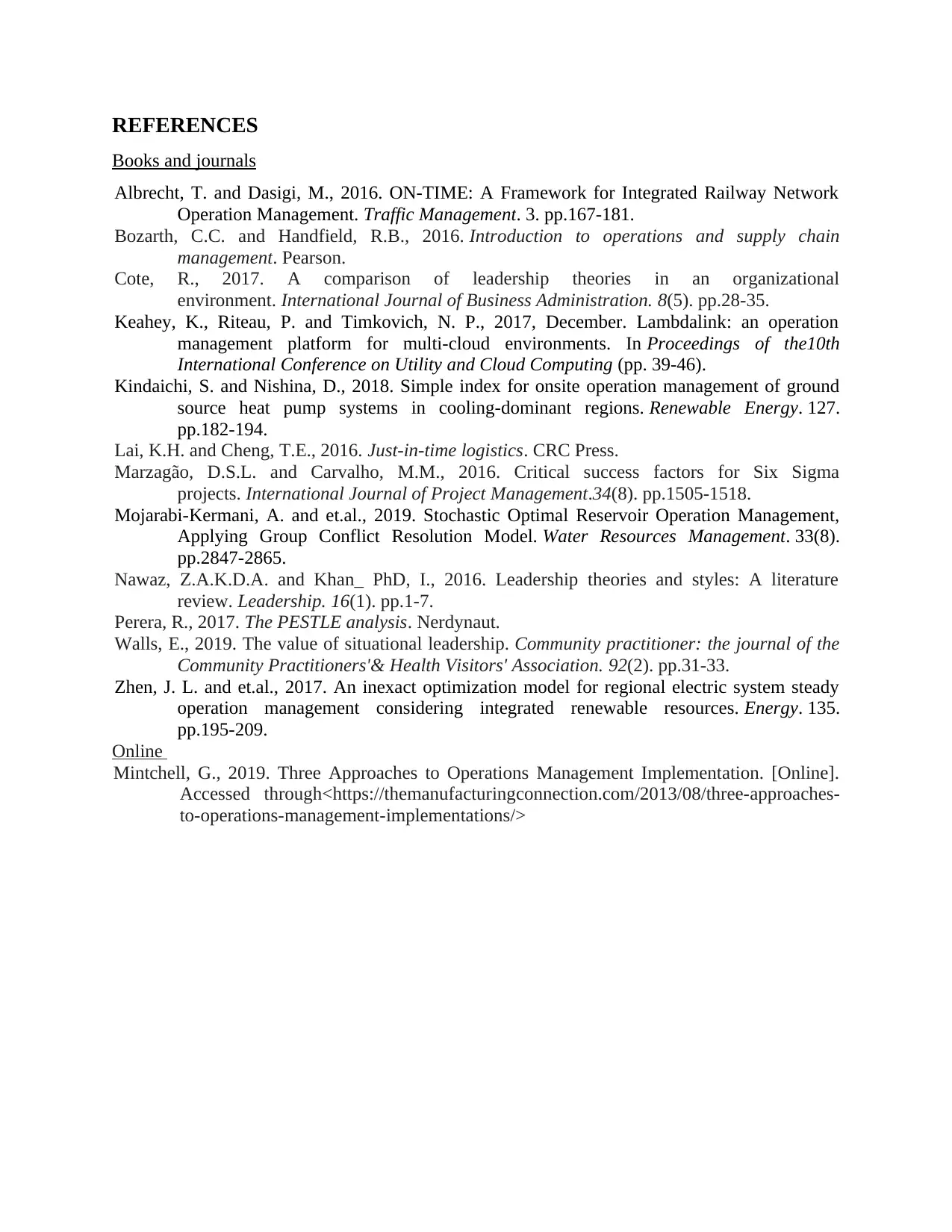
REFERENCES
Books and journals
Albrecht, T. and Dasigi, M., 2016. ON‐TIME: A Framework for Integrated Railway Network
Operation Management. Traffic Management. 3. pp.167-181.
Bozarth, C.C. and Handfield, R.B., 2016. Introduction to operations and supply chain
management. Pearson.
Cote, R., 2017. A comparison of leadership theories in an organizational
environment. International Journal of Business Administration. 8(5). pp.28-35.
Keahey, K., Riteau, P. and Timkovich, N. P., 2017, December. Lambdalink: an operation
management platform for multi-cloud environments. In Proceedings of the10th
International Conference on Utility and Cloud Computing (pp. 39-46).
Kindaichi, S. and Nishina, D., 2018. Simple index for onsite operation management of ground
source heat pump systems in cooling-dominant regions. Renewable Energy. 127.
pp.182-194.
Lai, K.H. and Cheng, T.E., 2016. Just-in-time logistics. CRC Press.
Marzagão, D.S.L. and Carvalho, M.M., 2016. Critical success factors for Six Sigma
projects. International Journal of Project Management.34(8). pp.1505-1518.
Mojarabi-Kermani, A. and et.al., 2019. Stochastic Optimal Reservoir Operation Management,
Applying Group Conflict Resolution Model. Water Resources Management. 33(8).
pp.2847-2865.
Nawaz, Z.A.K.D.A. and Khan_ PhD, I., 2016. Leadership theories and styles: A literature
review. Leadership. 16(1). pp.1-7.
Perera, R., 2017. The PESTLE analysis. Nerdynaut.
Walls, E., 2019. The value of situational leadership. Community practitioner: the journal of the
Community Practitioners'& Health Visitors' Association. 92(2). pp.31-33.
Zhen, J. L. and et.al., 2017. An inexact optimization model for regional electric system steady
operation management considering integrated renewable resources. Energy. 135.
pp.195-209.
Online
Mintchell, G., 2019. Three Approaches to Operations Management Implementation. [Online].
Accessed through<https://themanufacturingconnection.com/2013/08/three-approaches-
to-operations-management-implementations/>
Books and journals
Albrecht, T. and Dasigi, M., 2016. ON‐TIME: A Framework for Integrated Railway Network
Operation Management. Traffic Management. 3. pp.167-181.
Bozarth, C.C. and Handfield, R.B., 2016. Introduction to operations and supply chain
management. Pearson.
Cote, R., 2017. A comparison of leadership theories in an organizational
environment. International Journal of Business Administration. 8(5). pp.28-35.
Keahey, K., Riteau, P. and Timkovich, N. P., 2017, December. Lambdalink: an operation
management platform for multi-cloud environments. In Proceedings of the10th
International Conference on Utility and Cloud Computing (pp. 39-46).
Kindaichi, S. and Nishina, D., 2018. Simple index for onsite operation management of ground
source heat pump systems in cooling-dominant regions. Renewable Energy. 127.
pp.182-194.
Lai, K.H. and Cheng, T.E., 2016. Just-in-time logistics. CRC Press.
Marzagão, D.S.L. and Carvalho, M.M., 2016. Critical success factors for Six Sigma
projects. International Journal of Project Management.34(8). pp.1505-1518.
Mojarabi-Kermani, A. and et.al., 2019. Stochastic Optimal Reservoir Operation Management,
Applying Group Conflict Resolution Model. Water Resources Management. 33(8).
pp.2847-2865.
Nawaz, Z.A.K.D.A. and Khan_ PhD, I., 2016. Leadership theories and styles: A literature
review. Leadership. 16(1). pp.1-7.
Perera, R., 2017. The PESTLE analysis. Nerdynaut.
Walls, E., 2019. The value of situational leadership. Community practitioner: the journal of the
Community Practitioners'& Health Visitors' Association. 92(2). pp.31-33.
Zhen, J. L. and et.al., 2017. An inexact optimization model for regional electric system steady
operation management considering integrated renewable resources. Energy. 135.
pp.195-209.
Online
Mintchell, G., 2019. Three Approaches to Operations Management Implementation. [Online].
Accessed through<https://themanufacturingconnection.com/2013/08/three-approaches-
to-operations-management-implementations/>

Paraphrase This Document
Need a fresh take? Get an instant paraphrase of this document with our AI Paraphraser


1 out of 15
Related Documents
Your All-in-One AI-Powered Toolkit for Academic Success.
+13062052269
info@desklib.com
Available 24*7 on WhatsApp / Email
![[object Object]](/_next/static/media/star-bottom.7253800d.svg)
Unlock your academic potential
© 2024 | Zucol Services PVT LTD | All rights reserved.





